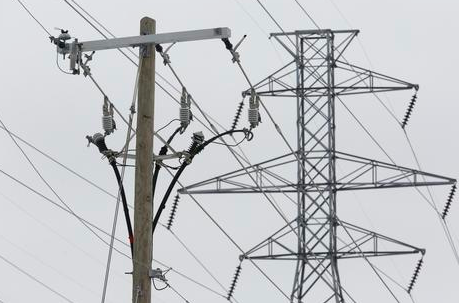(单词翻译:单击)
听力文本
Think for a moment about that famous survey suggesting that many people would struggle to pay an emergency expense of even a few hundred dollars. Now think about Texas, where some people suddenly have utility bills in the thousands of dollars. It's a side effect of last week's storm that overcame the power grid. People who managed to keep their power are now paying for it. Christopher Connelly is with member station KERA in Dallas and joins us now. Good morning.
CHRISTOPHER CONNELLY, BYLINE: Hi, Steve.
INSKEEP: What's an example of the kind of costs that people face?
CONNELLY: Right. So, well, I talked to Shannon Marrs. She has one of those big bills. She lives in Frisco, which is a Dallas suburb, with her husband, Mike, and three kids. In January, they paid 257 bucks for electricity.
INSKEEP: OK.
CONNELLY: And as of Saturday, the family's electric bill for the month of February was $10,180.76.
INSKEEP: Ow.
CONNELLY: During those — yeah. During those really cold days last week, the Marrses were paying 1 or $2,000 a day for electricity. Shannon Marrs said it makes her sick to her stomach to think about it.
SHANNON MARRS: It's awful, and there's nothing you can do. And I've been really stressed about it. And, you know, $10,000 is a ton of money.
INSKEEP: I guess you got to explain the Texas system here, because I mean, I get a utility bill. I pay the utility bill. I don't even necessarily know what my cost for a day is. How does this even happen?
CONNELLY: Right. So this is wonky. But bear with me here. So Texas has a deregulated market for electricity. It is designed so that when there's a shortage of electricity, the price will go up, and power companies will have an incentive to generate more electricity. That deregulated market also allows for the sale of unusual policies like the ones the Marrses have, plans with variable rates for electricity. And those are the customers who are ending up with these sky-high bills. The Marrs family spent hours trying to switch to a different company last week to find one with a more traditional fixed-rate plan. And normally, they would be able to do that. But the storm made that impossible. So they were just sitting there, watching the charges on their credit cards rack up.

INSKEEP: Does this suggest that this deregulation doesn't work?
CONNELLY: Well, it works great when the weather's good. But, you know, it appears that there weren't market incentives in this market system for power providers to make sure that they were prepared to weather a massive winter storm. You know, there have been warnings about that for years, actually, and the system broke down almost exactly like this about a decade ago. You know, the other issue that we're seeing is that the deregulated system assumes that consumers will fend for themselves, that they'll find an electricity plan where they won't get hosed if a big storm rolls in. Kaiba White from the consumer rights group Public Citizen says that just doesn't really happen.
KAIBA WHITE: In reality, people have a lot of different things tugging at their attention and their bandwidth. And so a lot of our economic decisions are actually made on autopilot. And therefore, you know, all these theories like that we will shop for the cheapest and best plan for ourselves — they don't play out.
INSKEEP: Well, is the state trying to help now?
CONNELLY: Yes. So there will be hearings looking into the issue this week. Governor Greg Abbott says no one should have to pay these exorbitant bills. And yesterday, the Public Utilities Commission temporarily blocked companies from sending out bills or shutting off customers' power for nonpayment. Abbott's also saying that the state will force power plants to weatherize, so they're prepared for the next storm. You know, and I got to say this level of government intervention feels anathema to the way Republicans have governed this state for decades. But, you know, there is so much political pressure right now to make changes, you know, because — even as people are just starting to repair burst pipes and get the water running again.
INSKEEP: Christopher Connelly of KERA, thanks.
CONNELLY: Thank you.
中文翻译
参考译文:
想想那项著名的调查,其表明许多人甚至难以支付几百美元的紧急开支。现在想想得克萨斯州,该州部分居民的电费账单突然暴涨至数千美元。这是上周的暴风雪带来的副作用,暴风雪导致电网瘫痪。那些设法保住电力供应的人现在正在为此付出代价。克里斯托弗·康纳利来自达拉斯成员站KERA,现在他将和我们连线。早上好。
克里斯托弗·康纳利连线:你好,史蒂夫。
因斯基普:人们面临的代价是什么?
康纳利:好。我采访了香农·马尔斯。她收到了巨额账单。她和丈夫迈克以及三个孩子住在达拉斯郊区弗里斯科地区。一月份,他们支付了257美元的电费。
因斯基普:好。
康纳利:截至周六,这个家庭2月份的电费是10180.76美元。
因斯基普:哇哦。
康纳利:没错。在上周那些非常寒冷的日子里,马尔斯夫妇每天要付1到2000美元的电费。香农·马尔斯表示,一想到这件事,她就生气。
香农·马尔斯:太可怕了,根本无能为力。我真的压力很大。一万美元可是一大笔钱。
因斯基普:我想你应该解释一下得克萨斯州的系统,因为我也会收到电费账单。我也要付电费账单。我甚至不知道我一天的花费是多少。这是怎么发生的?
康纳利:好。这有问题。请耐心点,听我解释。得克萨斯州的电力市场放松了管制。设计就是这样的,当电力短缺时,价格会上涨,电力公司会有动力生产更多电力。这种放松管制的市场也允许不寻常的政策,比如马尔斯夫妇选择的可变电价计划。选择这种计划的客户就是最终收到天价账单的人。上周,马尔斯为转到另一家电力公司,进行了数个小时的努力,他们想寻找实行更为传统的固定利率计划的公司。正常情况下,他们可以这样做。但暴风雨使这成为不可能的事情。因此他们只能坐在那里,看着信用卡上的收费越来越多。
因斯基普:这是否意味着这种放松管制的做法行不通?
康纳利:天气好的时候效果很好。但是,在这种市场体系中,似乎没有市场激励机制来确保电力供应商做好抵御大规模冬季风暴的准备。事实上,多年来,一直有人就此提出警告,而且这个系统在大约十年前曾因同样原因瘫痪过。我们看到的另一个问题是,放松管制的系统假定消费者将自食其力,自行找到一种电力计划,如果大风暴来临,他们不会受到影响。消费者权益组织“公民诉讼组织”的凯巴·怀特表示,但这并未实现。
凯巴·怀特:事实上,有很多不同的东西在吸引人们的注意力和带宽。因此,我们的许多经济决策实际上是在自动驾驶仪上做出的。因此,你所有这些理论,我们都会为自己寻找最便宜最好的计划,但这并未成功。
因斯基普:州政府有提供帮助吗?
康纳利:有。本周将进行听证会,调查这一问题。州长格雷格·阿博特表示,没有人应该支付这些过高的账单。昨天,公用事业委员会暂时禁止公司发出账单,或因拖欠电费而关闭客户电源。阿博特还表示,州政府将强制要求发电厂适应气候条件,因此他们要为下一场风暴做好准备。我要说,这种政府干预程度让人觉得共和党几十年来统治这个州的方式令人厌恶。但是,现在有如此多的政治压力要做出改变,即使人们刚刚开始修复爆裂的管道,让供水重新运转。
因斯基普:以上是KERA成员站的克里斯托弗·康纳利带来的报道,谢谢你。
康纳利:谢谢。
译文属可可原创,仅供学习交流使用,未经许可请勿转载
重点讲解
重点讲解:
1. go up (价格、数量或水平)上涨,上升;
If costs go up, there will be a pro rata increase in prices.
如果成本增加,价格就会相应上涨。
2. break down (讨论、关系或系统)失败,破裂,失灵;
Work came to a halt when the machine broke down.
机器一坏,工作便停了下来。
3. fend for oneself 照料自己;自谋生计;
His parents agreed to pay the rent for his apartment but otherwise left him to fend for himself.
他的父母同意替他付房租,其他的则让他自己解决。
4. in reality 事实上;实际上;
He came across as streetwise, but in reality he was not.
他给人的印象是很适应都市生活,但实际上并非如此。


